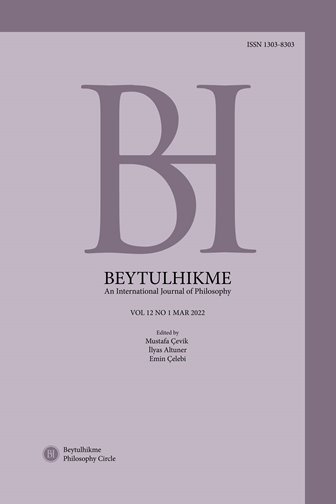Author :
Abstract
Pek çok kimseye göre bilincin varlığı yadsınamayacak kadar açıktır. Fakat onun ne olduğunu veya niçin ortaya çıktığını anlamak ise tam tersine oldukça zordur. Günümüzde bilinci anlama çabaları ve onun hakkında üretilen pek çok teori olsa da bu konuda bir uzlaşmadan bahsetmek mümkün değildir. Ancak, kimi felsefecilere göre, bilinci açıklama çabalarının karşılaştığı zorluklar, aslında ortada açıklanacak bir şeyin olmamasından kaynaklanmaktadır. Diğer bir ifadeyle, ortada açıklanacak bir bilinç yoktur ve bu nedenle de onu açıklamaya çalışmak, olmayan bir şeyi göstermek için uğraşmaya benzer. Ben, bu çalışmada, öncelikle, geçtiğimiz yüzyılın ikinci yarısında önemli isimler tarafından savunulmuş bu görüşün temel iddialarını ve argümanlarını inceleyeceğim. Ardından bu iddiaların bilincin yokluğunu göstermekte yetersiz kaldığını ve bilincin varlığını bize dayattığını savunmanın makul olduğunu öne süreceğim. Zira bilincin varlığı tezine dayanan halk psikolojimiz (gündelik kavramlarımız ve psikolojik açıklamalarımız vd.) yaşamımızın zorunlu bir parçasıdır ve bilinç elendiğinde onun yerini ne tür kavramların veya konuşma biçiminin alacağı açık değildir. En azından mevcut veri ve argümanlara dayanarak bilincin bir yanılsama olduğu iddiası hâlâ inandırıcılıktan uzaktır.
Keywords
Abstract
For many people, the existence of consciousness is undeniably obvious. But it is quite difficult to understand what it is or why it arises. Today, although there are many attempts to understand consciousness and many theories about it, it is not possible to talk to a consensus on the issue. However, according to some philosophers, the difficulties faced by efforts to explain consciousness stem from the fact that there is nothing to explain. In other words, there is no consciousness to explain, and therefore trying to explain it is like trying to show something that is not there. This is the reason for all the difficulties encountered. In this study, I will examine the main claims and arguments of this view, which were defended by important figures, especially in the second half of the last century. I will then argue that it is reasonable to argue that these claims fall short of demonstrating the absence of consciousness and that they still impose their existence on us. Because our folk psychology (our everyday concepts and psychological explanations etc.), which is based on the thesis of the existence of consciousness, is still a necessary part of our lives, and it is still not clear what kind of concepts or ways of speaking will be replaced when consciousness is eliminated. The claim that consciousness is an illusion still does not seem credible, at least based on the available data and arguments.
Keywords
- Blackmore, S. (2005) Consciousness: A Very Short Introduction. New York: Oxford University Press. doi: 10.1093/actrade/9780192805850.001.0001.
- Blackmore, S. ve Gregory, R. (2017) “Richard Gregory”, içinde Seda Akbıyık (çev.) Bilinç Üzerine Konuşmalar. İstanbul: Küre Yayınları.
- Chalmers, D. (1996) The Conscious Mind: In Search of a Fundamental Theory. Oxford University Press.
- Churchland, P. M. (1981) “Eliminative Materialism and the Propositional Attitudes”, Journal of Philosophy, 78(2), ss. 67–90.
- Churchland, P. M. (1999) Matter and Consciousness. London: MIT Press.
- Crick, F. ve Blackmore, S. (2017) “Francis Crick”, içinde Akbıyık, S. (çev.) Bilinç Üzerine Konuşmalar. İstanbul: Küre Yayınları.
- Crooks, M. (2004) “The Last Philosophical Behaviorist: Content and Consciousness Explained Away.”, Journal of Theoretical and Philosophical Psychology, 24(1), ss. 50–121.
- Dennett, D. C. (1991) Consciousness Explained. New York: Little, Brown and Co.
- Dennett, D. C. (1993) “Quining Qualia”, içinde Goldman, A. I. (ed.) Readings in Philosophy and Cognitive Science. Cambridge, MA: MIT Press, ss. 381–414.
- Dennett, D. C. (2003) “Explaining the ‘Magic’ of Consciousness”, Journal of Cultural and Evolutionary Psychology. doi: 10.1556/JCEP.1.2003.1.2.
- Dennett, D. C. (2013) Philosophy That Stirs the Waters. Available at: https://www.nytimes.com/2013/04/30/books/daniel-dennett-author-ofintuition-pumps-and-other-tools-for-thinking.html (Erişim: 13 Aralık 2018).
- Dennett, D. C. (2017) Bilinç Açıklanıyor. Çeviren Sibel Kibar. İstanbul: Alfa Yayınları.
- Dennett, D. C. (2018a) ‘Magic, Illusions, and Zombies’: An Exchange, The New York Daily. Available at: https://www.nybooks.com/daily/2018/04/03/magicillusions-and-zombies-an-exchange/ (Erişim: 11 Aralık 2018).
- Dennett, D. C. (2018b) Sezgi Pompaları ve Diğer Düşünme Aletleri. Çeviren O. Karakaş. İstanbul: Alfa Yayınları.
- Hasker, W. (1999) The Emergent Self. Ithaca: Cornell University Press.
- Koch, C. (2017) “Cristoph Koch”, içinde Susan Blackmore (ed.), Seda Akbıyık (çev.) Bilinç Üzerine Konuşmalar. İstanbul: Küre Yayınları, s. 320.
- Nagel, T. (2017) Is Consciousness an Illusion? Review: Daniel Dennett, From Bacteria to Bach and Back: The Evolution of Minds, The New York Review. Available at: http://www.nybooks.com/articles/2017/03/09/is-consciousness-an-illusiondennett-evolution/ (Erişim: 08 Aralık 2019).
- Price, H. H. (1964) Perception. London: Methuen Library Reprints.
- Revonsuo, A. (2010) Bilinç: Öznelliğin Bilimi. Çeviren Selim Değirmenci. İstanbul: Küre Yayınları.
- Rorty, R. (1993) “Mind-Body Identity, Privacy, and Categories”, içinde Christensen, S. M. ve Turner, D. R. (ed.) Folk Psychology and the Philosophy of Mind. New Jersey: Lawrence Erlbaum Associates Publishers, ss. 17–42.
- Searle, J. R. (1994) The Rediscovery of the Mind. London: MIT Press.
- Searle, J. R. (2018) Bilincin Gizemi. Çeviren İ. K. İçyüz. İstanbul: Küre Yayınları.
- Slagle, J. (2020) “Yes, Eliminative Materialism Is Self-Defeating”, Philosophical Investigations, 43(3), ss. 199–213.
- Stich, S. P. (1983) From Folk Psychology to Cognitive Science : The Case Against Belief. Cambridge: MIT Press.
- Strawson, G. (2002) The Consciousness Deniers, The New York Daily. Available at: https://www.nybooks.com/daily/2018/03/13/the-consciousness-deniers/ (Erişim: 11 Aralık 2018).
- Strawson, G. (2018) ‘Magic, Illusions, and Zombies’: An Exchange, The New York Daily. Available at: https://www.nybooks.com/daily/2018/04/03/magic-illusions-andzombies-an-exchange/.
- Taliaferro, C. (2011) “The Soul of the Matter”, içinde Baker, M. C. ve Goetz, S. (ed.) The Soul Hypothesis. New York: Continuum, ss. 26–45.
- Wittgenstein, L. (2009) Philosophical Investigations. Revised 4t. Çeviren G. E. M. Anscombe, P. M. S. Hacker, ve J. Schulte. Malden, MA: Blackwell Publishing.
- Wittgenstein, L. (2010) Tractatus Logico–Philosophicus. Çeviren O. Aruoba. İstanbul: Metis Yayınları.
